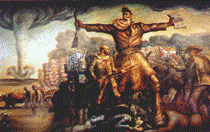History, Department of

James A. Rawley Graduate Conference in the Humanities
Date of this Version
April 2008
Document Type
Article
Abstract
This is an online work cataloguing the history of the UNL Science Departments. It has several pages focusing on digital collections, as well as some written analysis. To date the collection includes the Chemistry Department and Life Sciences Departments, although data for additional departments are currently being assembled from the Love Library Archives & Special Collections. Special emphasis is placed on lists of faculty and detailed timelines for each department. Additionally, the groups and clubs associated with each department, including the Chemistry Club and Botanical Seminar, are of particular interest as scientific communities which shaped the departments, university, and field. Additionally, collections of Christmas newsletters sent by various departments define the focus and values of the departments and university, and indicate the direction science is taking in particular fields. Agricultural work was particularly important at the end of the 19th Century, but industrial projects expanded at the beginning of the 20th Century and during the war years. Today, research and industry collaborate; the technological advances by the science departments have made this possible in previously unimaginable ways. The archival research has yielded interesting information on the way each department affected and was affected by the changes in the structure, size, and focus of the University of Nebraska, in eras such as the agricultural recessions, wartime industrial booms, baby booms, and technological shrinking of geographical distances. The structuring and focus of scientific communities at the University of Nebraska have defined the direction of the university and of scientific progress.


Comments
Paper presented at the 3rd Annual James A. Rawley Conference in the Humanities — Imagining Communities: People, Places, Meanings. Lincoln, Nebraska, April 12, 2008. Sponsored by the University of Nebraska–Lincoln History Graduate Students’ Association. Copyright © 2008 Susannah Hall.